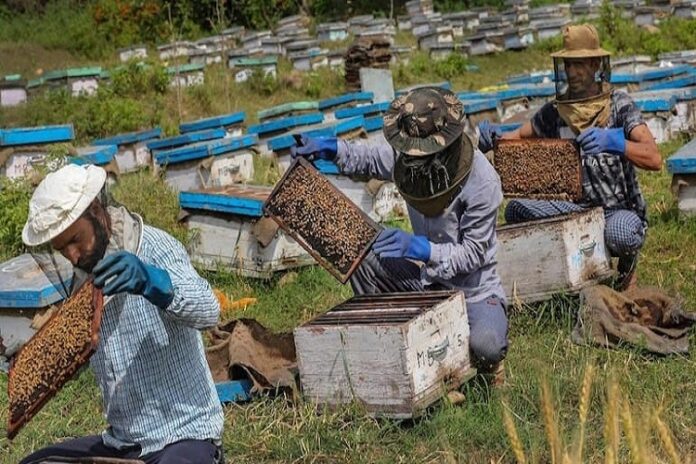The beekeeping industry in Kashmir is witnessing a sheer decline, with the number of farmers associated with it decreasing daily. There were days when beekeepers, or apiarists, could be seen in the open fields on each and every roadside in the valley, but such scenes are rare now.
Ghulam Qadir Teeli, a veteran beekeeper in the Tral area, has worked in the industry for the last 55 years.
“The industry is day by day losing its essence, after disease breakouts from time to time, which were never taken into consideration by any government,” says Teeli.
“I used to enjoy this work, with full fervour, and could feed my family without any inconvenience. Nowadays, nothing is going well in the industry, as many people who were permanently associated with it, have left, due to disease breakouts and other reasons.”
He thinks the government can still play a vital role in promoting the industry.
Experts say that various viral diseases among bee communities left many farmers unable to continue their work, as the diseases had no treatment.
They say the lack of chemicals and tools required to run an apiary may be another reason that people are losing interest in the profession.
Alarming declines in the health and survival of bees and other pollinators have started to affect crop production in many parts of the world.
Ecologist Ghulam Mohammad Andrabi told The Citizen that “yes, disease breakouts are the main reason, which left farmers dismayed, who couldn’t show more interest in maintaining the industry.”
The “unabated cutting” of black locust trees (Acacia rubina) in rural and urban areas, and uprooting of spurflowers (Plectranthus) in the forests of Kashmir are another reason the number of honeybees goes down here from time to time, said Andrabi.
“Besides untreated disease breakouts, cutting of black locust in jungles and residential areas is the main reason that a large number of honeybees die. Having to face all this, the apiarists lost interest in it, due to which it is declining,” Andrabi explained.
He agreed that chemicals and tools must be made available to farmers to “keep things active”.
The quality of Kashmir honey is widely considered superior. Andrabi says this is because Kashmiri honey is hydrophobic (water repellent), while honey in other parts is hygroscopic (tending to absorb moisture).
Senior journalist Syed Aijaz Nagbal describes how once, decades ago, a group of beekeepers came to him ruing that their bees were suddenly dying due to some disease. He said the news made it to many dailies at the time, and he still had some cuttings with him.
Nevertheless, government departments failed to trace the cause of the threatening disease, due to which the industry suffered massive damage, and “hundreds of farmers left the industry. Timely action and compensation to the farmers would have maintained it,” says Andrabi.
He agrees that the government can still play an important role, by compensating farmers for their losses, to preserve the beekeeping industry and curb disemployment.
Chief Agriculture Officer for the Pulwama district, Mohammad Qasim Ghani, said “we have a large number of people still associated with beekeeping, particularly in the Tral area, and we are trying our best to raise this industry at our own level.”
He said the district authorities had provided funds for the welfare of beekeepeers as well as a transport subsidy.
“Farmers were facing inconveniences during transportation on the National Highway. However, the department has timely sorted out all the issues. We want more people to take part in this noble industry,” said Ghani. #KhabarLive #hydnews







